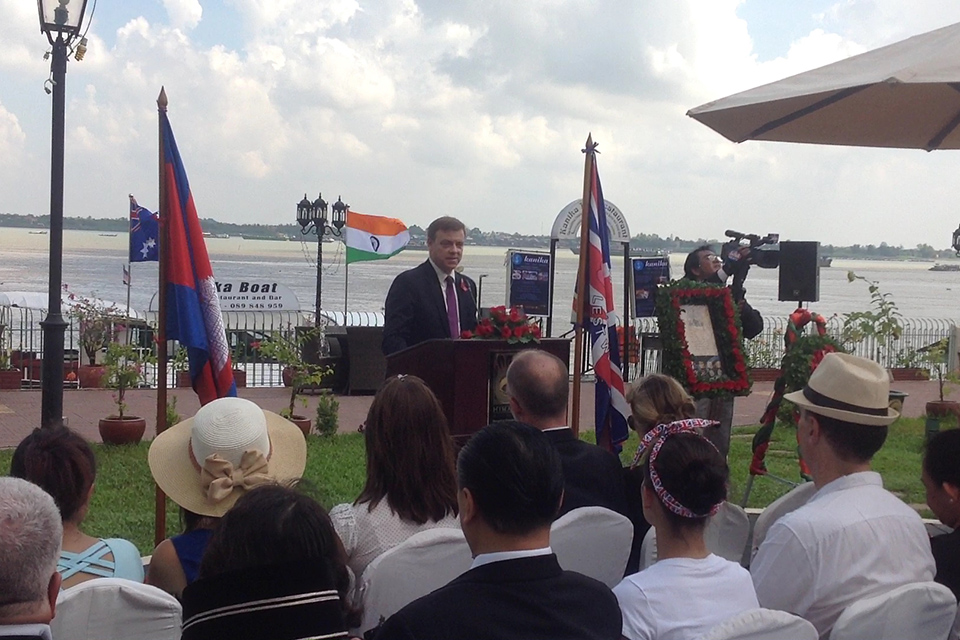Remembrance Day
British Ambassador addressing a solemn memorial service of remembrance

Ladies and gentlemen, boys and girls. May I first thank the British Chamber of Commerce and Andrew Tay and the staff of the Himawari hotel for organising today’s event. In most countries, including in Cambodia, we usually observe this day on Remembrance Sunday. And this year, as in every year, the Remembrance Sunday commemoration service in the UK was held in London at the Cenotaph led by HM the Queen honouring all of our heroes from Britain and the Commonwealth – it is they who are the ones who have given so much for the freedoms that we enjoy today.
Remembrance Sunday is the closest Sunday to the moment when the guns fell silent at the end of World War 1 in 1918 on the eleventh hour of the eleventh day of the eleventh month. This year, we chose here in Phnom Penh to mark this moment today - on the actual 11th – on Armistice Day. Part of the reason for this was practical – to avoid the clash with Cambodia’s national day celebrations and the end of the Water Festival holiday events. But it is also fitting that we do so in this year 2014, which marks the centenary of the outbreak of the Great War – World War One – which was supposed to be the war to end all wars.
This year has seen much reflection of the events that led up to the outbreak of the First World War and Britain’s entry into it on 4 August. Earlier this year, the Foreign & Commonwealth Office republished a series of telegrams sent by Ambassadors in the European Great Powers showing how an extraordinary and unpredictable series of events led to such a conflict, the scope of which was unimaginable hitherto. The wartime Foreign Secretary Sir Edward Grey, said on the eve of WW1: “The lamps are going out all over Europe; we shall not see them lit again in our lifetime.” These were prophetic words and this year many households, businesses and public buildings, including the Foreign Office in London, participated in the Lights Out event - a cultural programme to mark the centenary – and turned out their lights to leave a single candle or light burning.
Many expected WW1 to be a short-lived, with talk of troops being home by Christmas. However, by the November it was already clear that was not to be the case. That war would continue for 4 more long years with tens of millions of soldiers and civilians killed or seriously wounded. At an event to mark Armistice Day at the French Embassy this morning, I learnt that no fewer than 20,000 military and civilian support personnel from Cambodia also contributed to the conflict as part of the French Indochina effort.
Next month, we will reflect once again on that terrible conflict of 100 years ago, here in Cambodia, a country more familiar than most with the cost and tragedy of war. We will partner with European Embassies and local schools to mark the Christmas Truce. This was the spontaneous ceasefire between British and German soldiers fighting each other in the trenches on the Western Front on Christmas Day of 1914. They met in ‘no man’s land’, buried their dead, sang carols, exchanged gifts and even played an impromptu football match - a reminder that, even in the midst of the most terrible suffering and carnage, there is hope for reconciliation and humanity. And that strong and unshakeable alliances and friendships, such as we now enjoy in Europe, are possible between nations who were previously implacably opposed to each other. We aim to carry this message of hope to the youth of Cambodia through historical presentations and a friendly football tournament to recall this amazing event.
Ladies and gentlemen, we come here, of course, to pay our respects to all of the fallen and of the wounded in all conflicts over the last 100 years. 2014 also marked the 75th anniversary of the outbreak of WW2 and the 70th anniversary of the D-Day landings, commemorated by World Leaders, including HM the Queen, in Normandy this summer. This spirit of courage, bravery and sacrifice continues to the present day. As we welcome home our returning troops from Afghanistan, we grieve for the 453 of them who were lost to that conflict. We also pay tribute to the Cambodian troops currently serving overseas in UN Peacekeeping operations in countries as far afield as Mali and Lebanon. We wish them success in their missions and a safe return home upon their completion.
Today, as every day, we remember those who volunteered, served, fought, and died, all for the cause of freedom. We have with us today several veterans of these conflicts. We are grateful for your service. We thank you, and we salute you as we salute those who made the ultimate sacrifice for our freedom. We will remember them.